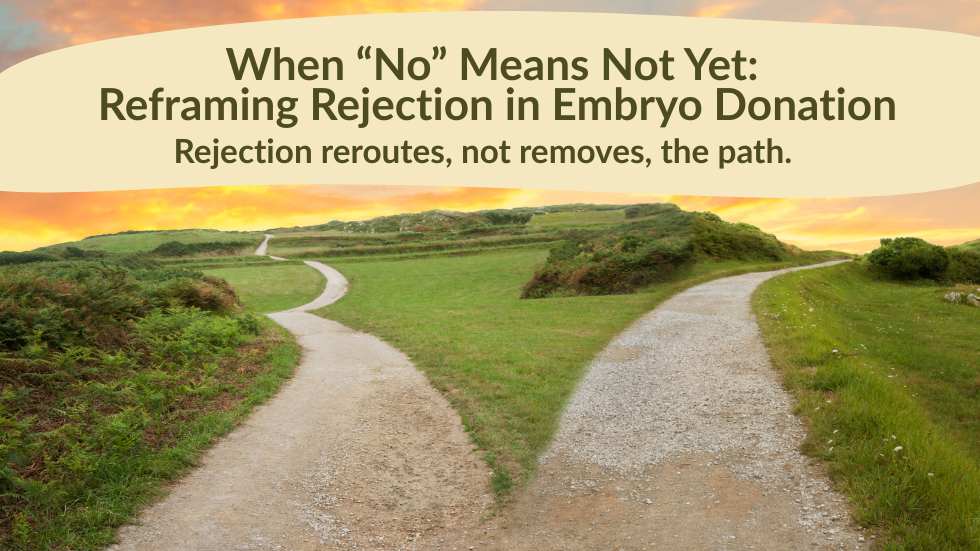Embryo donation is often described as a gift of hope, a deeply compassionate and generous act in which individuals or couples donate their remaining embryos to help others build a family. It is a decision grounded in love, empathy, and a desire to offer others the chance at parenthood.
However, beneath this selfless act lies a quiet reality that is not often discussed: the emotional weight of rejection.
Rejection can come in many forms. It might be an intended adoptive family choosing another donor, an agency expressing that there has not been a match, or even close friends or family not supporting your decision to place your remaining embryos for adoption. Regardless of where it comes from, rejection in this space can sting in deeply personal ways. It can make placing families question the value of their gift, their intentions, or even their role in the process.
However, rejection is not always a dead end. Sometimes, it is a redirection; a way to protect your heart, your values, and your embryos until the right match arrives.
The Emotional Landscape of Embryo Adoption
Donating embryos is not only a medical or legal process; it is an emotional one. Each embryo represents possibility and potential. Choosing to donate is often a way of honoring what could have been, by helping someone else create what could still be.
So when that offer is met with a “no,” it can feel devastating. It is natural to internalize the rejection, to wonder why, and to feel that your most intimate, meaningful gift is not wanted. But the reality is rarely that simple. The embryo adoption process is filled with layers: legal, emotional, relational. However, there are many considerations that go into making the right match. Adopting family preferences are a big factor, but perhaps even more significant is whether their fertility clinic will accept the embryos they’re matched with. Rejection often has more to do with fit than with failure.
Coping with the Unexpected
When you are initially met with a “no,” it is important to acknowledge the grief, sadness, or frustration you feel. This is a real loss. Even if it is temporary or abstract, it touches something deeply personal. Give yourself space to process. Talk to a therapist, journal, or connect with others who have walked a similar path. Ask questions and do research so you can better understand the situation.
Also recognize this: you don’t have to live in that grief. There are new ways to think about rejection that can protect your heart and open yourself up to new possibilities.
Reframing the Experience: When Rejection Is Actually Protection
A mismatch is not just a missed opportunity—it is a misstep avoided.
Embryo donation is not just about transferring embryos; it is about shared values, expectations, and emotional commitments. If an adopting family envisions a future that does not align with your hopes, whether around openness, communication, or the child’s understanding of his or her origins, that mismatch could lead to pain and regret for everyone involved.
A “no” in this case is not a reflection of your worth or that of your embryos; it is a protective measure, working to prevent long-term hurt and confusion.
Rejection as redirection.
Many embryo donors share that their first experiences with rejection were heartbreaking, but that, in time, they led to something better. They found families who deeply valued the embryos, honored the relationship, and shared their vision for the future. What once felt like a loss became a moment of redirection, gently guiding them toward a more fulfilling outcome.
You do not need many “yeses.” You only need the right one.
Rejection in embryo donation is rarely discussed, but it is deeply real. It touches something sacred, the intention to give life, to help others, and to find peace with your own journey. When that offering is declined, it can feel like a personal wound. The best embryo donation stories are those where both donor and adoptive family feel seen, respected, and aligned.
Nevertheless, it does not mean your gift is unworthy. It does not mean you are wrong. And it definitely doesn’t mean your story ends here.
Instead, consider that rejection may be doing something quietly profound: protecting your heart, preserving your intentions, and preparing the way for a recipient family who sees your donation not just as a means to an end, but also as a sacred trust.
Hold space for the right “yes.” It is out there. And it will be worth the wait.
To learn more about embryo donation and adoption, visit EmbyroAdoption.org.


Recent Comments